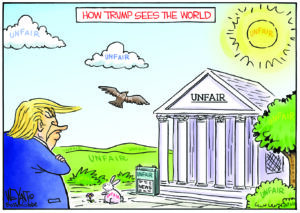We Have No Choice but to Resist Trump and the GOP With All Our Might
In just over two months, the Trump administration and its political and financial support system have given Americans cause for concern—but the situation is not beyond hope.
Protesters take to the streets in Chicago on March 24 to sound off against President Trump’s policies and proposals, including his bid to repeal and replace the Affordable Care Act. (Charles Rex Arbogast / AP)
It is hugely ironic that the U.S. government is currently dominated by conservative Republicans, even as the majority of the country identifies with progressive political positions. The very idea of a democracy—where people choose representatives to govern their society in line with their values—has been turned on its head.
Many concrete examples illustrate this point.
First, while most Americans care deeply about the impact of fossil fuels on climate change, Donald Trump has revived the Keystone XL pipeline, overturned his predecessor’s modest clean energy policies with the stroke of a pen and proposed slashing the Environmental Protection Agency’s budget.
Second, a majority of Americans are also deeply concerned about their right to digital privacy — so much so that a significant number have actually stopped using the internet in fear — and yet Senate and House Republicans swiftly passed, on a party-line vote, a bill allowing internet service providers to market users’ online activity for profit. The speed with which the bill was voted on and will likely be signed into law by Trump left most privacy advocacy organizations reeling and unable to mobilize the necessary public support in time.
Third, a majority of Americans are worried about their country becoming mired in more wars, and yet in just a few weeks the Trump administration has escalated our existing wars in Iraq, Syria and Yemen and promised to bump up the military budget by a whopping 10 percent. The only policy goal of conservatives that has failed in the past few weeks was the passage of Trump’s signature American Health Care Act, designed to repeal the Affordable Care Act and replace it with a far worse system of regulations. The repeal bill was hugely unpopular, and while it failed, it did so only because it was apparently not cruel enough for the extremist wing of the Republican Party known as the Freedom Caucus.
It is no wonder that Americans are under severe stress about the nation’s political outlook. A survey conducted by the American Psychological Association to gauge the nation’s stress level found that people began worrying about the presidential election as far back as the middle of 2016. By January, stress levels were extremely high with, “more than half of Americans (57 percent) report[ing] that the current political climate is a very or somewhat significant source of stress.” The survey also found that, “Two-thirds (66 percent) say the same about the future of our nation, and nearly half (49 percent) report that the outcome of the election is a very or somewhat significant source of stress.”
There is a serious dissonance between the direction of our political leadership and the aspirations of American people. Only about a quarter of the eligible voting public chose Trump to lead the country last fall, so it is no wonder that his policy proposals are aimed at pleasing only small fractions of the electorate, in spite of the president’s bluster about national unity.
In fact, anecdotal evidence suggests many Trump voters are surprised by how fast he is enacting his campaign promises. Given that he lost the popular vote, one might expect a little restraint, but the first two months of Trump’s tenure and the GOP’s full-throated support for most of his positions suggest that conservatives do not feel the need to earn a mandate.
The conservative political strategy, perfected over eight years of President Obama’s tenure, seems to be to pound as ferociously as possible on many arenas of government that work for the public good. Elites are floating in enough cash to fund the slickest possible propaganda aimed at convincing Americans that their policy positions are sensible. Extremist billionaire brothers Charles and David Koch engaged in what can be described as political bribery of GOP lawmakers to persuade them to vote against on the Obamacare repeal that the Kochs felt was not conservative enough. Lobbyists for telecommunication giants poured huge sums of money into campaign coffers to ensure the overturning of privacy regulations. There is so much money at the top that the most obvious manner in which it is trickling down is through the purchasing of political influence. There is no mystery over what is playing out in American politics. Income inequality has become so obscene that wealthy Americans have used their riches to essentially hijack our political process to continue to funnel money upward. The government, whose treasury we all pay into, rather than working for the common good, is being transformed, bit by bit, into a machine that diverts riches toward the already rich. No program for the poor and middle classes is sacrosanct — even those earned benefits that we pay for ourselves, like Social Security and Medicare. In fact, as with the Obamacare repeal, even Trump’s positions on those programs are not cruel enough for his party. Republicans, who love to use the term “entitlements” as though we are obtaining unfair and undeserved advantages, are determined to gut the popular programs even if Trump doesn’t want to.
The cruelty and hubris are stunning. GOP lawmakers, who rely on government-funded health care for themselves, take aim at our meager and inadequate current system because, according to them, it incurs too many government subsidies. Trump, who has bristled at the (seriously questionable) idea that the Obama White House spied on him, will be signing away the rights of all Americans to internet privacy. Trump’s proposed budget is so extreme in its targeting of poor Americans that The New Yorker dubbed it the ”Voldemort Budget.” What oozes out of this despicable matrix of barbarism is a streak of sadism not seen since the Gilded Age.
Unlike in earlier eras, Americans are able to communicate with one another as never before, and unprecedented technological tools exist to make political organizing easier than ever. The good news is that many people appear to be channeling their stress and depression over the current political climate into serious action. If the major street marches are any measure of anger and political awareness, there is reason for hope: After the massively successful Women’s March on Jan. 21, there was a symbolic one-day strike on International Women’s Day. Coming up are a host of events, including a tax-day protest, the March for Science, the People’s Climate March, and a May Day general strike.
The first congressional elections in the wake of Trump’s win appear to be marked by a liberal backlash. These include the special elections to fill Xavier Becerra’s seat in California, Ryan Zinke’s seat in Montana, Tom Price’s seat in Georgia, and Mike Pompeo’s seat in Kansas, where strong progressive candidates are leading.
If there is even the slightest silver lining to the naked devastation of the Trump regime in the last few months, it is that his reactionary politics is emboldening a latent movement for progress. The resistance to the Trump/GOP agenda is all that is standing between us and the coming near-certain sociopolitical annihilation. Progressive values are exactly what they claim to be — they point the way forward, not backward. We have no choice but to fight the assault from the right as hard as possible, no matter how depressing and hopeless the future may seem.
Your support matters…
Independent journalism is under threat and overshadowed by heavily funded mainstream media.
You can help level the playing field. Become a member.
Your tax-deductible contribution keeps us digging beneath the headlines to give you thought-provoking, investigative reporting and analysis that unearths what's really happening- without compromise.
Give today to support our courageous, independent journalists.






You need to be a supporter to comment.
There are currently no responses to this article.
Be the first to respond.